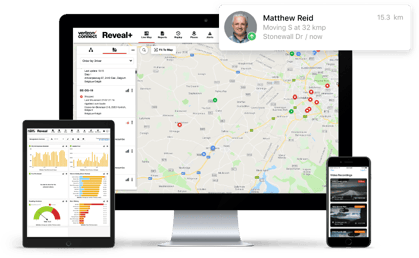9 Secrets to Reducing Fleet Expenses
As a fleet owner, your day-to-day costs can quickly add up. What you don’t know is there are further hidden, expensive...
Read more
For companies that employ mobile workforces and fleets of vehicles, optimising fleet management is an important and often overlooked business activity that can have a significant impact on the bottom line. This is particularly true for small to mid-sized businesses, where the business owner or general manager often makes the fleet management decisions. But at some point, in a company’s growth, it makes sense to hire a professional fleet manager. If you’re thinking about upgrading your fleet management system or wondering what fleet management duties and responsibilities are, you’ve come to the right place.
Let’s first take a look at what fleet management exactly is, why it’s such a critical part of business, and how it will continue to influence your bottom line.
Fleet management is the practice of managing commercial motor vehicles such as cars, vans and HGVs to ensure optimal utilisation, fuel consumption and maintenance. Fleet management duties and responsibilities may also include helping to coach drivers to improve fleet safety, compliance and liability. In some industries, such as construction and building contracting, fleet management can also include asset tracking and managing equipment from heavy cranes and bulldozers to smaller equipment such as trailers, generators and specialty tools.
Fleet management aims to maximise efficiency, increase productivity and improve safety for an organisation's vehicles and drivers. Often this is achieved using a combination of vehicle tracking, reporting on fuel consumption, monitoring driver behaviour and managing vehicle maintenance.
Behind salaries and benefits, fleet-related costs are generally one of the largest expenses at any company that relies on a fleet of vehicles and drivers to get the job done. It makes sense, then, that fleet manager is one of the most important roles for a business with a mobile workforce. Fleet management duties and responsibilities often ensure that company vehicles are well maintained and ready for use, and that their drivers are driving safely and in compliance with government regulations such as hours of service requirements and the Electronic Logging Device (ELD) mandate. Fleet managers work with critical employees across the business and their duties and titles can differ depending on the industry, vehicle types and company size.
According to Business Fleet, “A great fleet professional is able to lead and coach, not only the fleet team, but also drivers and multiple management levels. They’re able to inspire a team towards a common purpose or vision.”
A fleet manager with the following qualities and skills will have a better chance at success:
An effective fleet manager is not only tactical, but also business-minded and tech savvy. As a fleet grows in size, fleet management duties and responsibilities become more challenging and complex, including:
With their unique insights into fuel efficiency, vehicle maintenance, driver safety, regulations and fleet expenses, a fleet manager is one of the most important drivers of your business.
Though it used to be a job focused solely on managing your fleet’s schedule, fleet management duties and responsibilities today include being able to lead and coach, not only the fleet team but also drivers and multiple management levels. For a small business, a fleet manager might also be the service or office manager, so they have other duties to fulfill in addition to managing the fleet.
A successful fleet manager establishes a cooperative, working relationship with all internal functions within the corporation that are associated with the fleet function:
A good fleet manager requires an aptitude for interpersonal communication in addition to the traditional technical knowledge and organisational skills associated with this role. It takes a lot of people and skill to keep a fleet going so collaborating across these disciplines can mean the difference between being on time and late, and between profit and loss. Fleet managers need to be forceful, yet tactful and be able to encourage people to do tasks they might not want to do.
Great fleet professionals work with suppliers and other partners to optimise their performance. Some employ supply-chain management techniques, such as bringing suppliers together as a team to facilitate communication with each other to provide efficient, low-cost services to the fleet. They set the safety and maintenance standards for the fleet as well as handle all the administrative work.
The impact of data analysis and advanced technology is already being seen across the fleet landscape. Getting up to speed with new innovations, analysis, data, near real-time updates and more, can be daunting, but once a fleet manager understands how to use this technology, it will make their job exponentially easier in the long run.
Fleet management technology can help you:
Fleet management solutions can make the life of a fleet manager easier as well as drive overall cost savings and operational efficiencies for any company. Find out more here.
Tags: Cost control, Customer service, Data & analytics, Dispatching & scheduling, Payroll, Productivity & efficiency, Safety, Team management




Find out how our platform gives you the visibility you need to get more done.
As a fleet owner, your day-to-day costs can quickly add up. What you don’t know is there are further hidden, expensive...
Read moreVerizon Connect Reveal tracks the fleet data that can have a big impact on your business. These are things like where...
Read moreReveal tracks the fleet data that can have a big impact on your business. These are things like where your vehicles are...
Read moreWork smarter from quote to completion with an end-to-end fleet management solution...
Read more